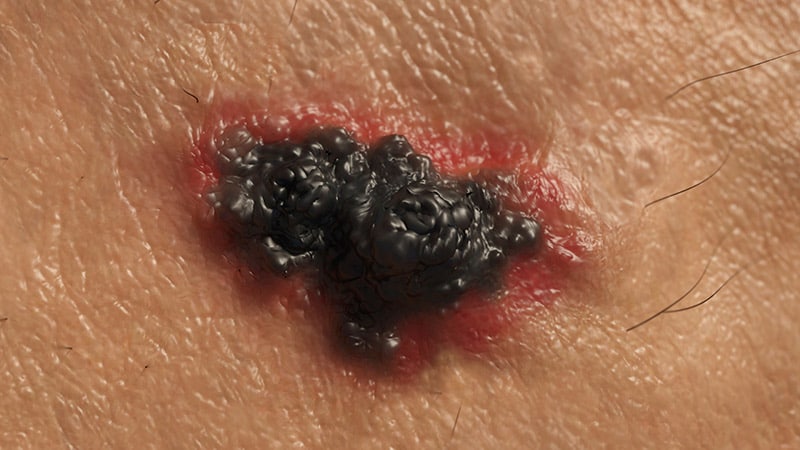TOPLINE:
The novel Tumor Profiler (TuPro) project, which analyzed melanoma samples using nine independent technologies, demonstrated feasibility in guiding treatment decisions. Molecular tumor board recommendations on the basis of TuPro were deemed useful in 75% of cases.
METHODOLOGY:
- Despite advances in melanoma therapy, many patients experience relapse and lack effective treatment options. Multiomics and single-cell profiling promise comprehensive tumor insights but require evaluation for feasibility and clinical utility in guiding treatment decisions.
- Researchers conducted a prospective, multicentric observational project (TuPro) enrolling 116 patients with any subtype of melanoma, from whom 126 biopsy samples were collected at three Swiss hospitals from January 2019 to November 2020. The TuPro application cohort included 93 patients (103 biopsy samples).
- The biopsies were analyzed using nine independent technologies, including single-cell genomics, transcriptomics (single-cell RNA sequencing [scRNA-seq]), targeted proteomics (imaging mass cytometry [IMC]), drug phenotyping (Pharmacoscopy), and digital pathology, which generated up to 500 Gb of data per sample within a 4-week turnaround time.
- The molecular tumor board evaluated data from all technologies to inform treatment recommendations across three patient groups: adjuvant setting (n = 13), palliative standard of care (n = 45), and palliative beyond standard of care (n = 37). The median follow-up duration was 20.5 months.
TAKEAWAY:
- Patients in the palliative standard-of-care group achieved an objective response rate of 60% and a disease control rate of 62%, whereas those in the palliative beyond standard-of-care group achieved an objective response rate of 38% and a disease control rate of 54%.
- In a matched analysis of patients who received at least three treatment lines, the median progression-free survival reached 8.34 months in the TuPro cohort vs 2.0 months in the non-TuPro cohort (adjusted hazard ratio, 0.23; 95% CI, 0.07-0.79; adjusted P = .0201), suggesting benefit in heavily pretreated patients.
- Molecular data from TuPro were considered useful by the multidisciplinary molecular tumor board in 75% of evaluated cases, representing a 39% and 33% increase in concordance vs standard clinical workup alone (diagnostic levels 1 and 2, respectively). The TuPro workflow led to actual therapies in 87% of cases.
- A minimal set of four technologies (next-generation DNA sequencing [NGS], IMC, Pharmacoscopy, and scRNA-seq) could cover all 54 markers used for treatment decision-making at 1.15-fold higher costs than those for the standard NGS for adjuvant or palliative standard-of-care settings and 1.8-fold higher costs than those for the palliative beyond standard-of-care setting.
IN PRACTICE:
“This study demonstrates the feasibility of using advanced multiomics approaches, including spatial proteomics, to guide therapy decisions in late-stage melanoma — one of the most aggressive and treatment-resistant cancers — with a reproducible patient benefit,” said Stéphane Chevrier, PhD, CSO, and cofounder of Navignostics and contributor to the TuPro study, in a press release. “This is a major step toward pan-cancer diagnostics. By providing a comprehensive view of the tumor biology, the approach could eventually identify features that are predictive for treatments across cancer indications.”
SOURCE:
The study, led by Nicola Miglino, the University of Zurich and University Hospital, Zurich, Switzerland, was published online in Nature Medicine.
LIMITATIONS:
The current approach of selecting markers for treatment decisions by human experts did not capture all potentially relevant information. The retrospective comparison between TuPro and non-TuPro cohorts limited extrapolation and generalizability of the results. Additionally, definitive conclusions about the clinical value of serial sampling cannot be drawn owing to heterogeneous results and a small sample size.
DISCLOSURES:
The study received an open-access funding from the University of Zurich. Several authors reported having advisory roles or receiving research funding and having other ties with various pharmaceutical companies. Additional disclosures are noted in the original article.
This article was created using several editorial tools, including AI, as part of the process. Human editors reviewed this content before publication.
Source link : https://www.medscape.com/viewarticle/multiomics-platform-may-guide-melanoma-treatment-2025a1000ioy?src=rss
Author :
Publish date : 2025-07-15 12:41:00
Copyright for syndicated content belongs to the linked Source.
